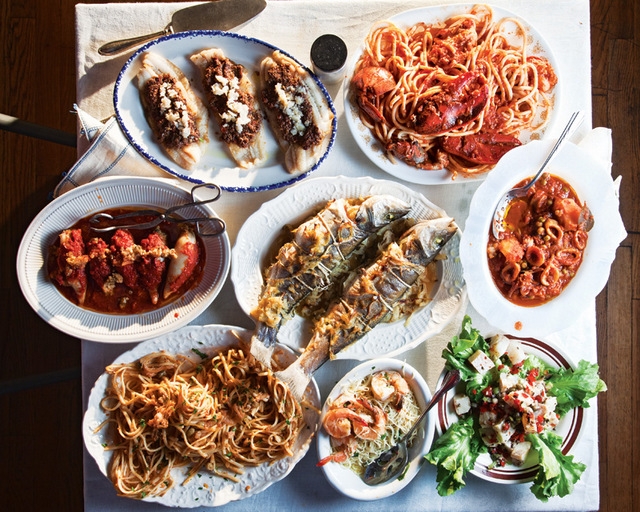Strada Italiano
Press release
The Feast of the Seven Fishes will be served this Christmas Eve at Strada Italiano in downtown Asheville to celebrate the Italian-American tradition and the use of seafood in the family meal as a way of abstinence from meat, a long Roman Catholic tradition during various days of the week as well as during Lent. This year’s feast menu is available on the website, and reservations will be taken by phone.
There have been several interpretations of the feast’s commemoration throughout history, however esteemed food writer Domenica Marchetti tells the story below very well. Whatever the true affiliation, it is a tradition that remains special in any Italian-American family, and will be provided locally by Anthony Cerrato, owner and chef of Strada Italiano Restaurant.
Feast of the Seven Fishes: Only in America
Ask Gabriella Marchetti about the Feast of the Seven Fishes and she’ll probably give you a look like you just served her a bad clam.
My mother, who was born and raised in Italy’s Abruzzo region but has lived in the U.S. since the 1950s, has always maintained a distance between her own Italian culinary customs and those she perceives to be Italian-American. The Feast of the Seven Fishes—the elaborate seven-course fish dinner that many families of Italian descent serve on Christmas Eve—falls into the latter category.
“I never heard it called that,” she said when I asked her about it recently. “Non esiste in Italia.” Translation: It doesn’t exist in Italy.
That is not to say Italians don’t eat seafood on Christmas Eve. They do, lots of it. So did we at our home in New Jersey—pasta with tuna-tomato sauce, braised calamari, shrimp, skate wings, eel (both roasted and sautéed) and more. We just never assigned a number to the meal or called it the Feast of the Seven Fishes. To us it was either la vigilia (the vigil), as the feast is called throughout Italy or, more often, Christmas Eve dinner.
No matter what you call it though, this seafood extravaganza is becoming more popular, and not just in the homes of people of Italian persuasion.
Theories abound as to the origins of the feast and the significance of the number seven. Most are tied to Roman Catholic traditions dating back to the 4th century that required members of the church to refrain from eating meat during certain holy days. But cookbook author Amy Riolo, who writes about food and culture and whose family hails from Calabria, says it’s possible that the tradition predates Christianity and is rooted more in celebration than in abstinence.
“Fish was a celebratory food in ancient Egypt,” says Riolo, “At one time people worshipped the Nile. The river flooded naturally twice a year and provided them with a bounty of fish. There were festivals around these occurrences.” Many of these pre-Christian festivals were Christianized as the church’s influence grew.
The number of courses or type of fish served at the meal is open to interpretation, Riolo says.
As for my family, we did finally embrace the concept of the Seven Fishes dinner, thanks in large part to my brother-in-law Tony, who brought the tradition with him when he married my sister. Although our menu has changed over the years, there are a couple of favorites that we all insist on, including my mother’s braised calamari and her tuna-tomato sauce, which is spicy and savory and, best of all, counts as two fishes because it has anchovies. We’ll still probably need to pull open a tin of smoked oysters or sardines to reach that magic number seven. Or maybe we’ll pass around a bag of Swedish fish.
Excerpt printed with permission of American Food Roots and Domenica Marchetti. To read the full article, please visit americanfoodroots.com/features/feast-of-seven-fishes/.




Before you comment
The comments section is here to provide a platform for civil dialogue on the issues we face together as a local community. Xpress is committed to offering this platform for all voices, but when the tone of the discussion gets nasty or strays off topic, we believe many people choose not to participate. Xpress editors are determined to moderate comments to ensure a constructive interchange is maintained. All comments judged not to be in keeping with the spirit of civil discourse will be removed and repeat violators will be banned. See here for our terms of service. Thank you for being part of this effort to promote respectful discussion.